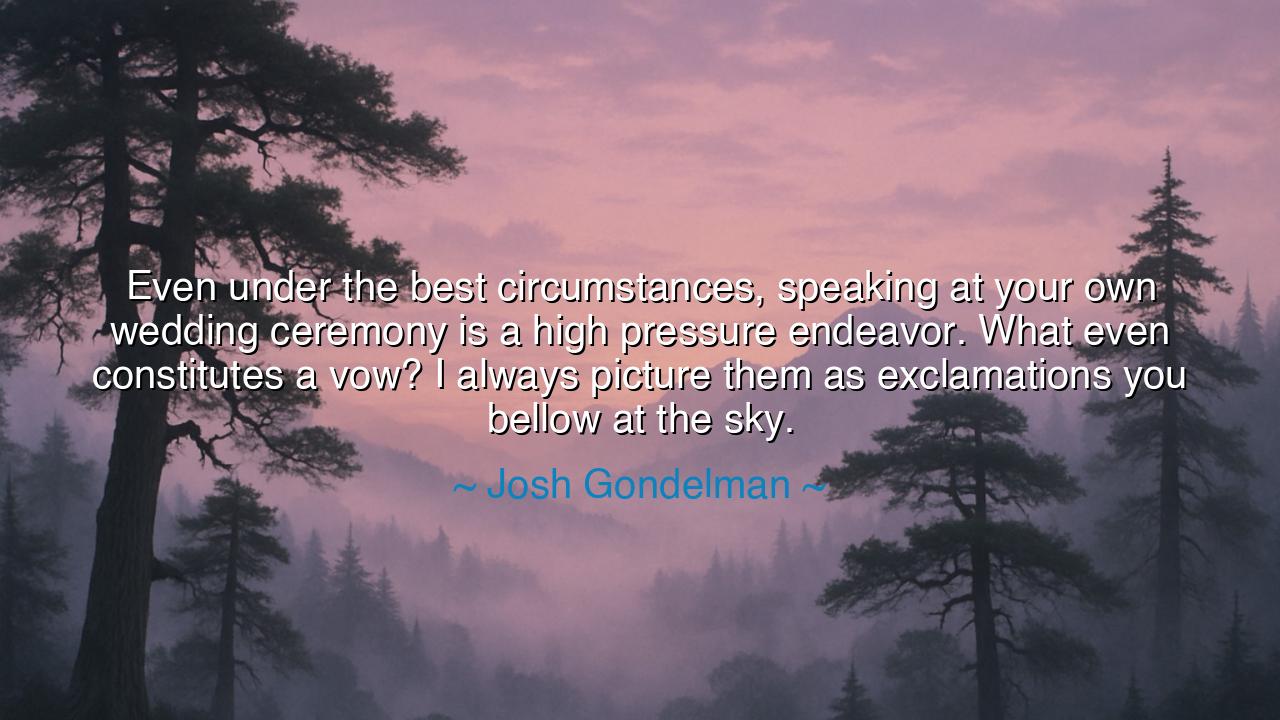
Even under the best circumstances, speaking at your own wedding
Even under the best circumstances, speaking at your own wedding ceremony is a high pressure endeavor. What even constitutes a vow? I always picture them as exclamations you bellow at the sky.






In the words of Josh Gondelman, we hear both the weight and the wonder of sacred speech. He declares that even in the best circumstances, to speak at one’s own wedding ceremony is a task heavy with pressure. For how can mere words capture the depth of a vow? What, indeed, constitutes a vow? He imagines them as cries to the heavens, exclamations bellowed at the sky, as though love itself demanded to be declared before the cosmos. In this vision, we see that vows are not small promises, but sacred utterances, thunder made by mortal lips.
The ancients understood the gravity of words spoken in ritual. Among the Romans, an oath sworn before the gods bound not only the speaker but his household, and to break it was to invite divine wrath. A vow at a wedding was no less serious: it was not merely sentiment, but covenant. Gondelman’s reflection captures this same truth: that to stand before witnesses and declare one’s love is to bind the soul in words that echo beyond the moment.
His imagery of bellowing at the sky recalls the primal need for words to be not just spoken but proclaimed. When one weds, it is not enough to whisper love in secret; it must be shouted in defiance of time and fate, so that heaven, earth, and all who hear bear witness. The vow is both fragile and eternal—fragile, for it depends on human lips; eternal, for it calls upon forces greater than the self.
History offers its reflection in the story of Ruth, who vowed to Naomi, “Where you go, I will go; your people shall be my people.” Though not a wedding vow, it bore the same sacred weight, and its power has endured through centuries. Her words, like Gondelman’s imagined exclamations, were not polite statements but cries of devotion, binding her fate forever to another’s. Such is the power of vows: they outlast the moment, becoming legacy.
Therefore, let this truth be remembered: a vow is not mere poetry, but a declaration forged in fire. To speak it is to step into eternity, to bind one’s soul with the strength of words. Wedding vows, whether whispered or bellowed at the sky, are the bridge between two hearts and the universe itself. Gondelman’s words remind us that though the task is daunting, it is precisely in that pressure that vows draw their sacred power—for nothing eternal was ever born without weight.






HNLa Han Huynh Nguyen
Josh Gondelman’s comparison of wedding vows to exclamations shouted at the sky is a unique and funny take on something many people find nerve-wracking. It’s interesting how vows are traditionally seen as solemn declarations of love, yet they can often feel like an intense performance. Do you think the significance of wedding vows is more about the intention behind them than the words themselves? How do you feel about the pressure to make them perfect?
DTCong Duong Thanh
Josh Gondelman’s humor brings a refreshing perspective to wedding vows, which can often feel like a performance under high pressure. The idea of bellowing vows at the sky is a funny but relatable image of how much weight is placed on this moment. Do you think vows should always be dramatic or is it more meaningful when they are simple and heartfelt? Does the pressure to speak perfectly take away from the authenticity of the moment?
QMLe Quang Minh
I love Josh Gondelman’s take on wedding vows—they do carry so much pressure, and the idea of exclaiming them to the sky feels oddly fitting for such an emotional moment. It makes me wonder, though, what really makes a vow meaningful? Is it the grand declaration, or the quiet commitment behind it? How important do you think the delivery of vows is compared to the emotions they are meant to express?
NNPham Le Nhu Ngoc
Josh Gondelman’s humorous reflection on wedding vows brings a lighter perspective to a traditionally serious moment. The pressure to speak eloquently during such a high-stakes occasion is real, and his image of shouting vows at the sky is both funny and fitting. Do you think this pressure for perfection makes vows more meaningful, or is it better to focus on what feels true to the couple, rather than trying to meet an expectation?
YTy ttyvttu
Josh Gondelman’s take on wedding vows is so relatable. The idea of speaking at your own wedding, especially with the pressure to get everything right, can feel overwhelming. His comparison of vows to exclamations bellowed at the sky paints such a vivid picture of the intensity of the moment. Do you think the pressure to say something profound in those moments actually takes away from the meaning, or does it add to the sincerity of the vows?